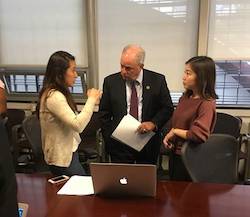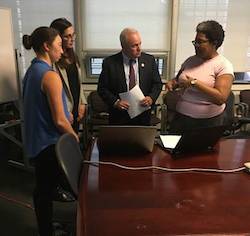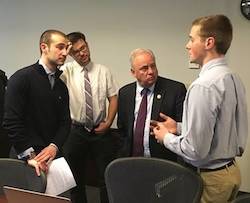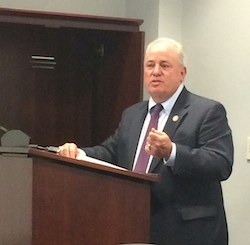Engineering students and Congressman Doyle explore the role of tribology in industry and the economy
Lisa Kulick
Apr 19, 2017
Car tires gripping the road while making a sharp turn. Eye drops moisturing dry contact lenses. Scrambled eggs sticking to a frying pan.
These examples of friction, lubrication, and wear demonstrate the everyday importance of tribology, the science of interacting surfaces in relative motion. Industries like manufacturing, energy production, transportation, health care, and space exploration rely on research in this field. And, local and national economic development is dependent on it as well.

Source: Department of Mechanical Engineering
This semester, Carnegie Mellon University students had the opportunity to share tribology research projects with United States Representative Mike Doyle as part of the course, Material Selection for Mechanical Engineers. The students had worked in teams to identify tribology-related issues that hinder the reduction of energy use and are important to the local economy.
The students consulted with technical staff from Arconic, Carmell Therapeutics, Kennametal, PPG Industries, Westinghouse, and Windstax who gave them further insight on their research topics. These included 3D metal printing, knee and hip replacement surgery, hard coatings for tools, coatings for windows, nuclear power plant components, and wind turbines.
I wanted the students to make the connection between what they are learning in the classroom and how it applies to real-world problems in industry.
Maarten de Boer, Professor, Mechanical Engineering, Carnegie Mellon University
On March 31, each student team presented their work to Rep. Doyle and professors in the field of tribology from the University of Pittsburgh. Doyle, who serves on the House Energy and Commerce Committee, also addressed the class about a resolution in the House of Representatives that emphasizes the impact of tribology on the U.S. economy and competitiveness. This resolution (H.RES.916) highlights the need for increased research and development investment in tribology.
Professor of Mechanical Engineering Maarten de Boer saw this resolution, and Rep. Doyle's role on the Energy and Commerce Committee, as a unique opportunity for the students in his course.
“I wanted the students to make the connection between what they are learning in the classroom and how it applies to real-world problems in industry," said de Boer. "And, to understand the role that government plays in research and economic development.”
“Another important outcome for the students was learning to articulate their work in short, concise presentations to someone without a background in mechanical engineering. This is an extremely valuable skill that future engineers need to have,” he said.


